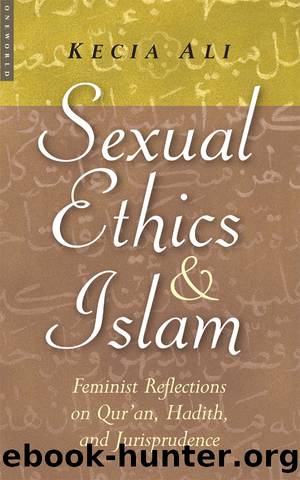Sexual Ethics and Islam by Kecia Ali

Author:Kecia Ali
Language: eng
Format: epub
Publisher: Oneworld Publications
Published: 2011-08-14T16:00:00+00:00
Conclusion
One promising avenue for change is from within the legal tradition, but there are limits to the impact the ‘ulama can have on the practice of FGC. Some scholars have begun the process of attempting to shift the frame of reference and treat female circumcision as a medical procedure, as activists have suggested,38 rather than a religious ritual and marker of Muslim identity. In doing so, they have suggested a different set of standards by which to judge associated practices. Shaykh al-Tantawi, stating that the Qur’an contains nothing on the subject and that the hadith attributing any stance to the Prophet are weak, opines that therefore one should defer to the views of doctors. On medical grounds, of course, the “surgery” fails basic qualifications for performance. Egyptian jurist Gad al-Haq, among others, however, objects to this approach on the grounds that medical knowledge is continuously changing and evolving, and it is foolish to fore-sake what is eternal for what is ephemeral.39 While the ‘ulama can be instrumental in struggles to eradicate FGC, there will likely always be dispute among its members. Further, relying on internal struggles within the ‘ulama or even campaigns to legally ban FGC (as an Egyptian law did before it was overturned) ignores the crucial point that formal religious authority may not be the most salient ground for both practitioners and those who make decisions about following the practice, who are uniformly female, even though religious sentiment is influential.
What tactics should be employed by activists, and what role should religion play as a justification? Activist A’Haleem’s appeal for a “final religious announcement” against FGC relies on a mistaken view of Islamic religious authority as something unidirectional and static. Pronouncements in this vein, such as that by Swedish Sheikh Ahmed, suppress rather than promote interpretive leeway. A historically contextualized approach – which recognizes the likelihood that the practice existed but also that it is deeply troubling in many respects – can support a process of gradual change. Although based on a tendentious presentation of the hadith text, the Minaret of Freedom’s broader conclusion that the Prophet’s directive as quoted in Abu Dawud “clearly forbids severity in circumcision and bases such limitation on both the potential to harm the woman and the potential to make her less desirable to her husband” seems more appropriate (though “forbids” might be replaced by “advises against”). The pamphlet argues, though, that “Permitting such a ritual constitutes an act of tolerance by Islamic law for pre-Islamic practices, and may be overruled by the Islamic prohibition against harmful acts.”40 Both of these points are potentially helpful. One can think of female genital cutting as something subject to gradual change and, as Kevin Reinhart has pointed out, it can be liberating to think in terms of principles rather than specifics. Nonetheless, caution is warranted in claiming a power to “overrule” accepted practices on the basis of broad principles.
Changes in public policy and national law without concomitant changes in public opinion are futile, and potentially even counterproductive. Reform in legal thought is slow, and is not a guaranteed success.
Download
This site does not store any files on its server. We only index and link to content provided by other sites. Please contact the content providers to delete copyright contents if any and email us, we'll remove relevant links or contents immediately.
| Hadith | History |
| Law | Mecca |
| Muhammed | Quran |
| Rituals & Practice | Shi'ism |
| Sufism | Sunnism |
| Theology | Women in Islam |
The History of Jihad: From Muhammad to ISIS by Spencer Robert(2628)
Nine Parts of Desire by Geraldine Brooks(2369)
The Turkish Psychedelic Explosion by Daniel Spicer(2357)
The First Muslim The Story of Muhammad by Lesley Hazleton(2271)
The Essential Rumi by Coleman Barks(2046)
1453 by Roger Crowley(2031)
The Last Mughal by William Dalrymple(1858)
Trickster Travels: A Sixteenth-Century Muslim Between Worlds by Davis Natalie Zemon(1847)
Muhammad: His Life Based on the Earliest Sources by Martin Lings(1646)
God by Aslan Reza(1644)
by Christianity & Islam(1633)
A Concise History of Sunnis and Shi'is by John McHugo(1567)
No God But God by Reza Aslan(1545)
Magic and Divination in Early Islam by Emilie Savage-Smith;(1534)
The Flight of the Intellectuals by Berman Paul(1503)
Nothing to Envy by Barbara Demick(1450)
Art of Betrayal by Gordon Corera(1431)
What the Qur'an Meant by Garry Wills(1394)
Getting Jesus Right: How Muslims Get Jesus and Islam Wrong by James A Beverley & Craig A Evans(1342)
